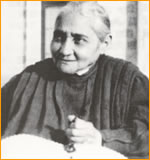The Servant of God Luisa Piccarreta was born in Corato in the Province of Bari, on April 23,1865 and died there in the odor of sanctity on March 4, 1947.
Luisa had the good fortune to be born into one of those patriarchal families that still survive in our realm of Puglia and like to live deep in the country, peopling our farmhouses. Her parents, Vito Nicola and Rosa Tarantino, had five children: Maria, Rachele, Filomena, Luisa and Angela. Maria, Rachele and Filomena married. Angela, commonly called Angelina, remained single and looked after her sister until she died.
Luisa was born on Mercy Sunday
Luisa was born on the Sunday after Easter and was baptized that same day. Her father – a few hours after her birth – wrapped her in a blanket and carried her to the parish church where holy Baptism was administered to her.
Nicola Piccarreta was a worker on a farm belonging to the Mastrorilli family, located at the middle of Via delle Murge in a neighborhood called Torre Disperata, 27 kilometers from Corato. Those who know these places, set among the sunny, bare and stony hills, can appreciate the solemnity of the silence that envelops them. Luisa spent many years of her childhood and adolescence on this farm. In front of the old house, the impressive, centuries-old mulberry tree still stands, with the great hollow in its trunk where Luisa used to hide when she was little in order to pray, far from prying eyes. It was in this lonely, sunny spot
place that Luisa’s divine adventure began which was to lead her down the paths of suffering and holiness. Indeed, it was in this very place that she came to suffer unspeakably from the attacks of the devil who at times even tormented her physically. Luisa, to be rid of this suffering, turned ceaselessly to prayer, addressing in particular the Virgin Most Holy, who comforted her by her presence.

Luisa Piccarreta
Divine Providence led the little girl down paths so mysterious that she knew no joys other than God and his grace. One day, in fact, the Lord said to her: "I have gone round and round the world again and again, and I looked one by one at all my creatures to find the smallest one of all. Among so many I found you.
Your littleness pleased me and I chose you; I entrusted you to my angels so that they would care for you, not to make you great, but to preserve your littleness, and now I want to begin the great work of fulfilling my will. Nor will you feel any greater through this, indeed it is my will to make you even smaller, and you will continue to be the little daughter of the Divine Will" (cf. Volume XII, March 23, 1921).
When she was nine, Luisa received Jesus in the Eucharist for the first time and Holy Confirmation, and from that moment learned to remain for hours praying before the Blessed Sacrament. When she was eleven she wanted to enroll in the Association of the Daughters of Mary – flourishing at the time – in the Church of San Giuseppe. At the age of eighteen, Luisa became a Dominican Tertiary taking the name of Sr. Maddalena. She was one of the first to enroll in the Third Order, which her parish priest was promoting. Luisa’s devotion to the Mother of God was to develop into a profound Marian spirituality, a prelude to what she would one day write about Our Lady.
Detachment from oneself and all
Jesus’ voice led Luisa to detachment from herself and from everyone. At about eighteen, from the balcony of her house in Via Nazario Sauro, she had a vision of Jesus suffering under the weight of the Cross, who raised his eyes to her saying: "O soul, help me!". From that moment an insatiable longing to suffer for Jesus and for the salvation of souls was enkindled in Luisa. So began those physical sufferings which, in addition to her spiritual and moral sufferings, reached the point of heroism.
The family mistook these phenomena for sickness and sought medical help. But all the doctors consulted were perplexed at such an unusual clinical case. Luisa was subject to a state of corpse-like rigidity – although she showed signs of life – and no treatment could relieve her of this unspeakable torment.

